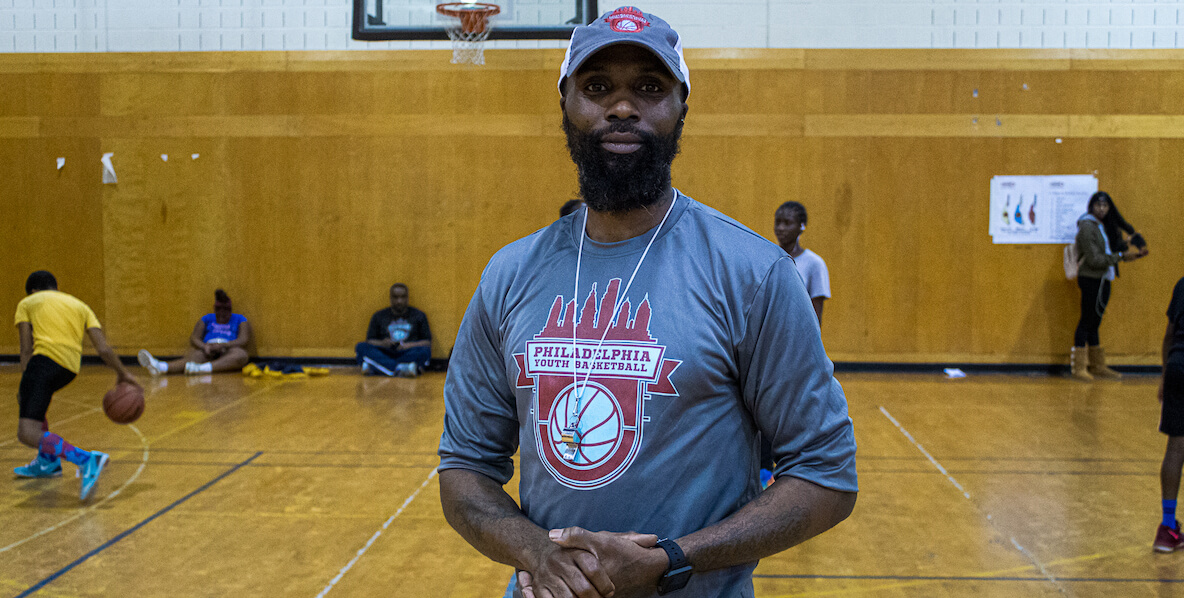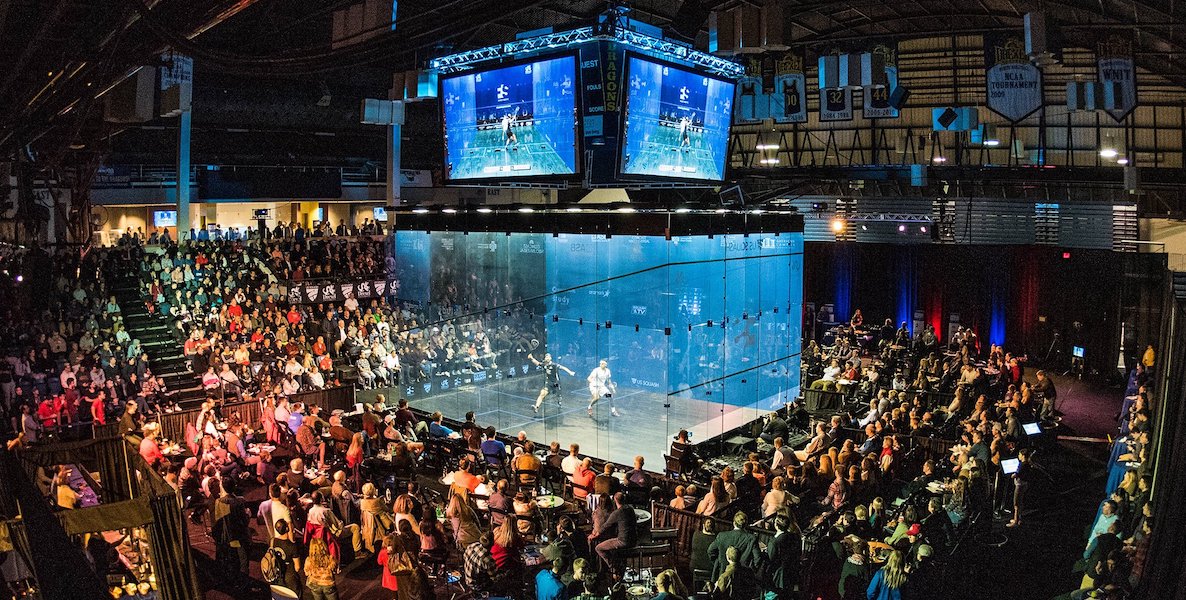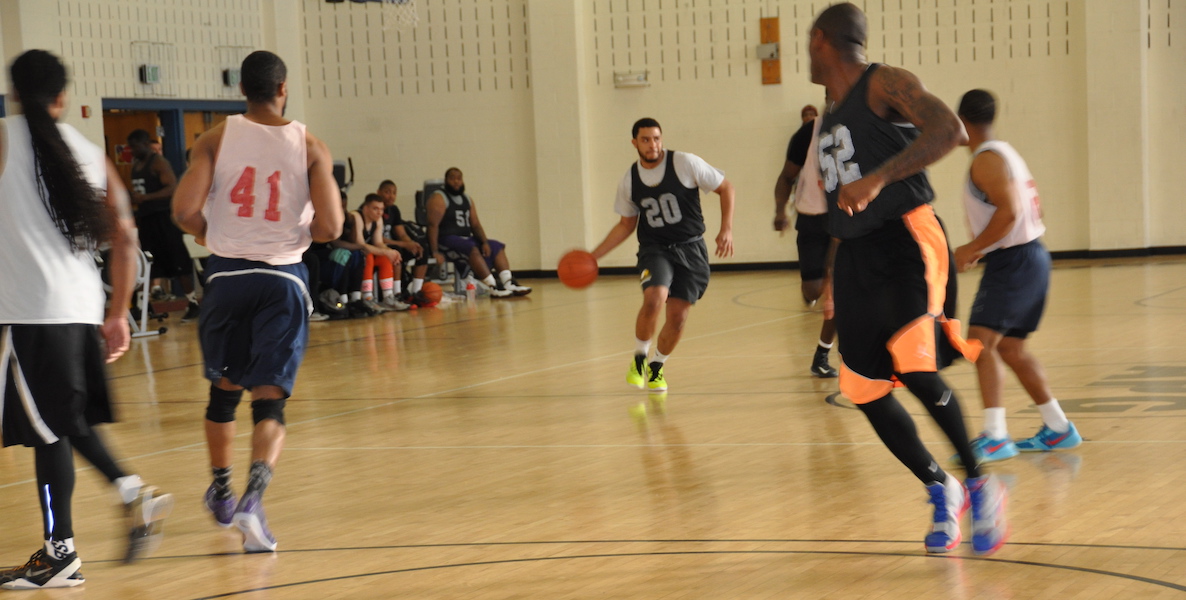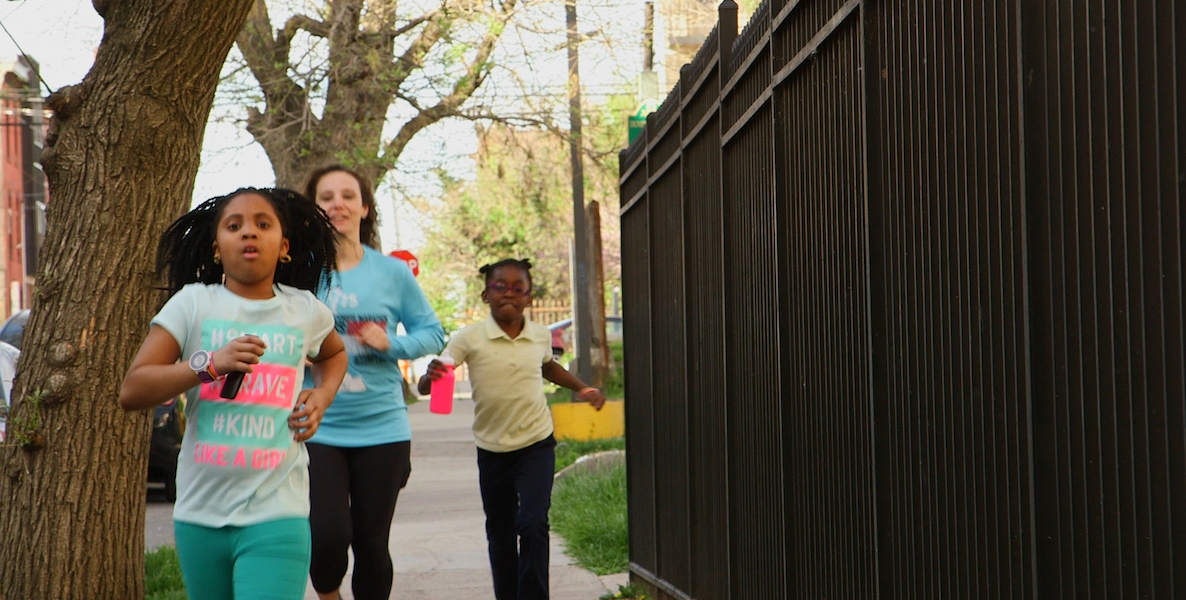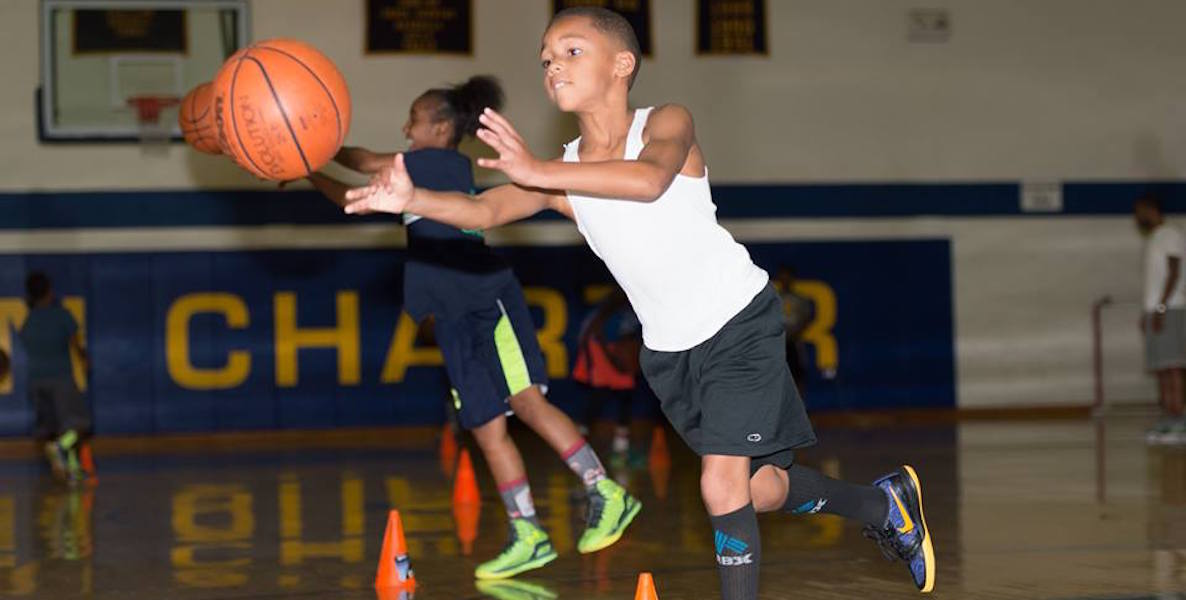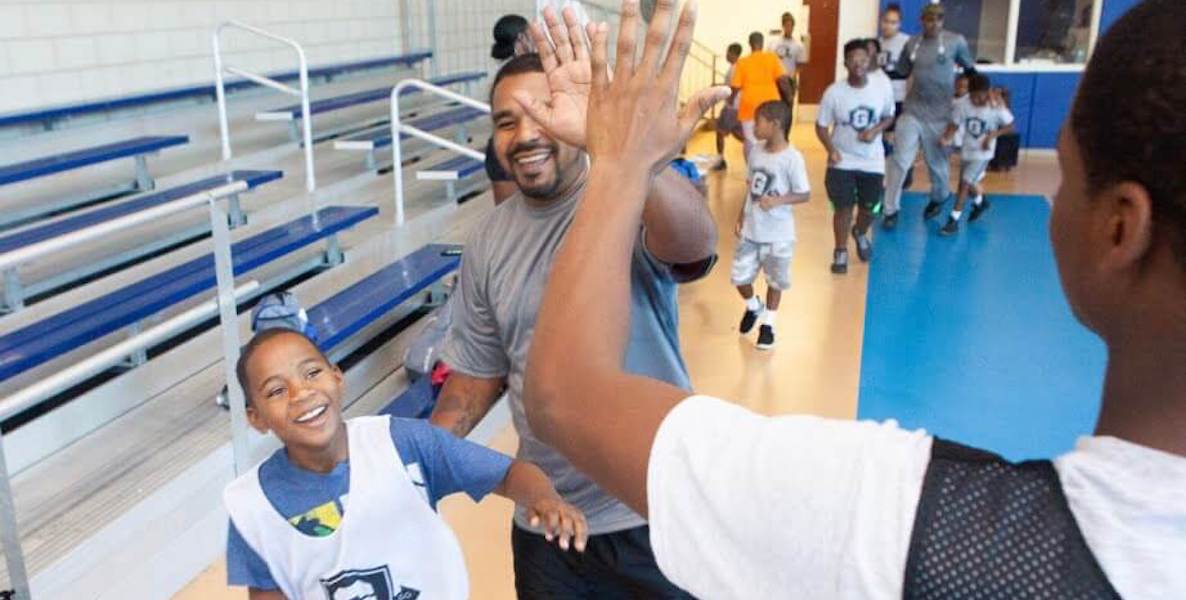For the non-jocks in the room: In sports, the give-and-go is, by definition, “a play (as in basketball or hockey) in which a player passes to a teammate and immediately cuts toward the net or goal to receive a return pass.”
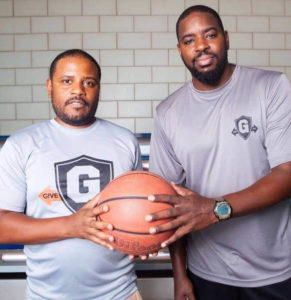
That same spirit of teamwork and community underlies Give and Go Athletics, the North Philly-based nonprofit founded in 2009 by Andre Wright and Caleb Jones.
“It’s a way of giving your time, your energy, really your love to the kids. That’s how we try to move the community,” says Jones. Last year alone, Give and Go served 1,000 kids through their summer basketball camps, baseball and basketball leagues, and in-school and after-school programs.
In everything the men do, they strive to carry on the legacy of their own childhood mentors, Alonzo Hickerson and Victor Jones, Caleb’s father. Living in Brewerytown in the ’80s and ’90s, Wright says, parents worried any time their kids weren’t home—unless they were at “The Rec,” the Athletic Recreation Center on North 26th Street.
“The Rec was our safe haven. That’s where everybody congregated. Our parents knew that if we were at The Rec, we were ok. Anywhere else, our parents were terrified about where we were,” Wright says one afternoon by Zoom, proudly donning a “Rec n Crew” baseball cap, in homage to the Center, along with his Give and Go tee.
![]() It was at The Rec where Wright and Jones first met, as players on opposing basketball teams. Jones’ father coached a team of his own sons and the kids who were considered troubled—the kids nobody wanted. Andre followed in the footsteps of his older brother, Terrell Wright, a phenom on the court (and now an assistant coach at Community College of Philadelphia), and played among rising stars for Coach Hickerson.
It was at The Rec where Wright and Jones first met, as players on opposing basketball teams. Jones’ father coached a team of his own sons and the kids who were considered troubled—the kids nobody wanted. Andre followed in the footsteps of his older brother, Terrell Wright, a phenom on the court (and now an assistant coach at Community College of Philadelphia), and played among rising stars for Coach Hickerson.
“You had the highly talented group of kids who were sought out, then you also had the kids who nobody wanted. But they all had an opportunity at The Rec,” Wright says. “Caleb’s father and my coach worked very closely together and were able to bring the whole community together. No matter what was going on in the neighborhood, when they came to The Rec, everything was great because those adults worked together.”
Crossing Paths Later in Life
Those coaches and their example made such a strong impression on young Wright and Jones, that both went on to become therapists—and found their paths crossing years later when they both took jobs as mental health specialists at General John F. Reynolds Elementary School, adjacent to the notorious Norman Blumberg Apartments projects, in Sharswood.
“Give and Go is providing what neighborhoods of wealth have built-in: sports programming, and mental health services,” says Ricky Staub, director of the forthcoming Concrete Cowboy. “The hook is sports, but Andre and Caleb are mental health therapists, and the second they have money, they do incredible things with it.”
“Blumberg Projects were like the black eye of the neighborhood. Everyone was afraid of it. There was a lot of violence, a lot of poverty,” Wright explains. He and Jones were tasked with helping kids who’d experienced trauma thrive in their classrooms, by providing group and individual therapy.
But around the time they both started at Reynolds, the School District removed funding for extracurricular programs—gone went basketball and gone went chess and, with them, safe spaces for kids.
Wright and Jones weren’t having it.
They invited a handful of the kids they’d been working with to come out on Saturdays to play basketball on the courts at 26th and Master streets. A month later, they had 30 kids showing up. They started giving the kids daily reports to show their teachers, to teach them accountability.
“Teachers would send notes back to us on our reports, saying Whatever you’re doing, it’s working,” Wright says. “You got all the boys who won’t listen to listen!”
Jalen Roberts, now 22, was among the kids in that first small cohort.
“Give and Go was our outlet,” he says. “No one else in the community was doing anything like that—offering free services to teach kids how to play sports. Once Andre and Caleb came along, they gave all the kids hope. We had something to do.” Roberts is now a successful videographer and the head of digital media for Give and Go.
As a young adult, he now sees the real power of Give and Go. “It’s not about dribbling a basketball or how far you can throw a football or how hard you can hit a baseball. It’s about the person that you are and how you can be a better person. They really tackle the mental and emotional part and really get kids feeling good about themselves. They give them confidence to really be who they want to be in this world,” he says.
“We Knew We Could Do Better …”
Back in 2009, the men didn’t overthink their initial efforts; they just got started. “We did everything backwards,” says Wright. “We started working with kids before we had the formal structure or any money because it just needed to be done. Caleb’s dad and Alonzo Hickerson, they just did it. And we have to give them credit for that.”
Jones says he was sick and tired of seeing organizations fail the kids who needed them most, like camps that would promise visits with players on the Eagles, and then never follow through. “They treat the kids who’ve got nothing like shit,” he says. “We knew we could do better than that.”
Through a woman they knew in the community, Give and Go became fiscally sponsored by RHD (Resources for Human Development), which covered things like insurance and put them in an incubator program. Eventually, they branched out on their own.
They run on a shoestring budget, thanks to financial support from microgrants, individual donors, and dedicated groups of parents who fundraise to support in-school programs. (Their fee-for-service programs offset the cost of the ones they provide for free.)
They employ about 15 to 20 people, mostly young Black men and women, primarily during the summer months, and rely on about 10 volunteers year-round. Wright currently works full-time for Give and Go, while Jones is still employed by SDP.
Getting Support—and Results
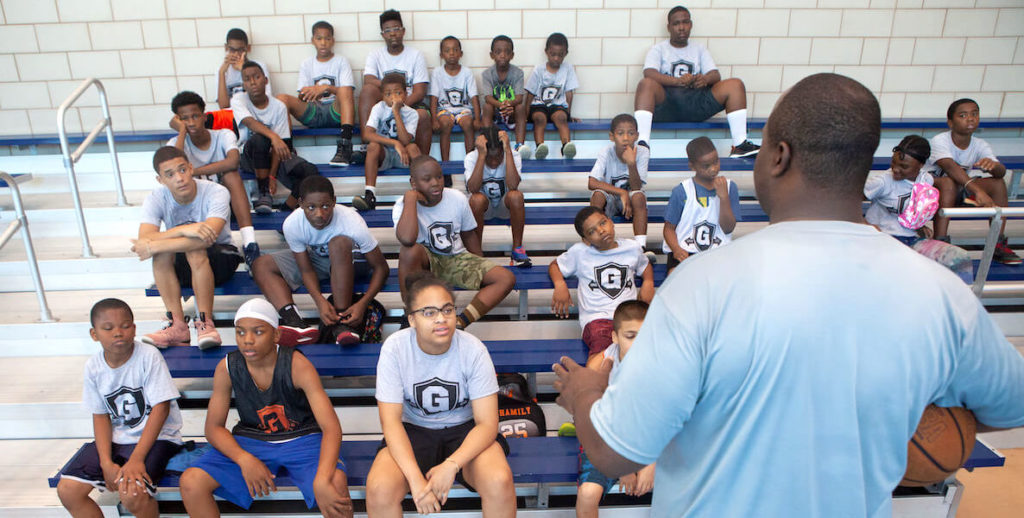
The dedication of Wright and Jones, as well as their results, are largely what drew actor James McAvoy—who calls Philly his “second home”—to praise Give and Go, and pitch for its support, on The Tonight Show last month. And it’s why director Ricky Staub—whose film Concrete Cowboy, about North Philly urban horse riders, starring Idris Elba, premieres at the Toronto Film Festival in September—joined its board.
![]() “In a lot of ways, Give and Go is providing what neighborhoods of wealth have built-in: sports programming, and mental health services,” says Staub, founder of Neighborhood Film Company. “What makes Give and Go particularly unique is that they’re using sports to provide mental health care for kids in neighborhoods of trauma. The hook is sports, but Andre and Caleb are mental health therapists, and the second they have money, they do incredible things with it.”
“In a lot of ways, Give and Go is providing what neighborhoods of wealth have built-in: sports programming, and mental health services,” says Staub, founder of Neighborhood Film Company. “What makes Give and Go particularly unique is that they’re using sports to provide mental health care for kids in neighborhoods of trauma. The hook is sports, but Andre and Caleb are mental health therapists, and the second they have money, they do incredible things with it.”
Jones says that much of their success has to do with their authenticity with the kids. “They don’t need that cookie-cutter, candy sprinkle-coated [view],” he says. “If you’re Black or you’re a woman or you’re gay or you’re not the norm, you have to fight. You need to know the real shit, so that you can survive. And the kids love that.”
“We know what we do works,” says Wright. “We’ve had kids who’ve gone through our program go off to college and come back to work as counselors. This model is the model to change America. We know what our kids need, we believe in them, we just need more support.”
Wright is all about showing his vulnerable side. “It’s unfair for me to try to tell a kid to be a true version of himself if I’m not being that example for them,” he says. “It’s necessary for me to tell them my stories of resilience, my failures, what I did in life and how I messed up. Because kids can relate to that. You have to be real with them so that you can make the necessary connection so that they can reach their full potential.”
Tara Desmond is a parent of three kids who attend Bache-Martin Elementary, where Give and Go runs the recess program; her twin 8-year-old sons have also attended Give and Go’s summer camp in Brewerytown.
Desmond has been blown away by the impact Wright and Jones have had on her kids. “Andre and Caleb just embody positivity,” she says. “They’ve built their programming to be as much about life as it is about sports. They want the kids to know their strengths, work on their weaknesses, value and help their teammates and have fun doing all of that,” she says.
For all of the positive feedback Wright and Jones get from the community, their work hasn’t been without hurdles. They’ve watched copycats run off with their ideas; they’ve had groups fail to pay them for programming; they’ve had lunch vendors simply not show up.
“My blood boils thinking about how much we’ve gone through just to keep Give and Go alive,” Wright says. “But we can’t let it dissolve. If this was about money, we would’ve let it dissolve a long time ago.”
![]() With tears streaming down his face, Wright says that no setback, financial or otherwise, can keep him and Jones away from the work. “I’ve been quiet about it for a very long time, but I feel like the world needs to know how important this model is,” he says. “We know what we do works. We’ve had kids who’ve gone through our program go off to college and come back to work as counselors. This model is the model to change America. We know what our kids need, we believe in them, we just need more support.”
With tears streaming down his face, Wright says that no setback, financial or otherwise, can keep him and Jones away from the work. “I’ve been quiet about it for a very long time, but I feel like the world needs to know how important this model is,” he says. “We know what we do works. We’ve had kids who’ve gone through our program go off to college and come back to work as counselors. This model is the model to change America. We know what our kids need, we believe in them, we just need more support.”
With more funding, Jones could do the work full-time, and Give and Go could reach even more kids. Funding or not, for Wright and Jones, Give and Go is a calling.
“I see that George Floyd stuff every day,” Jones says, referencing the racism that underlies every aspect of American society. “Teachers and parents and people stepping on these kids’ necks and breaking these kids every single day. I had to figure out how to move in a way that’s effective, and that’s what Andre and I have learned how to do. We’ve learned how to be effective, despite whatever’s going on.”



